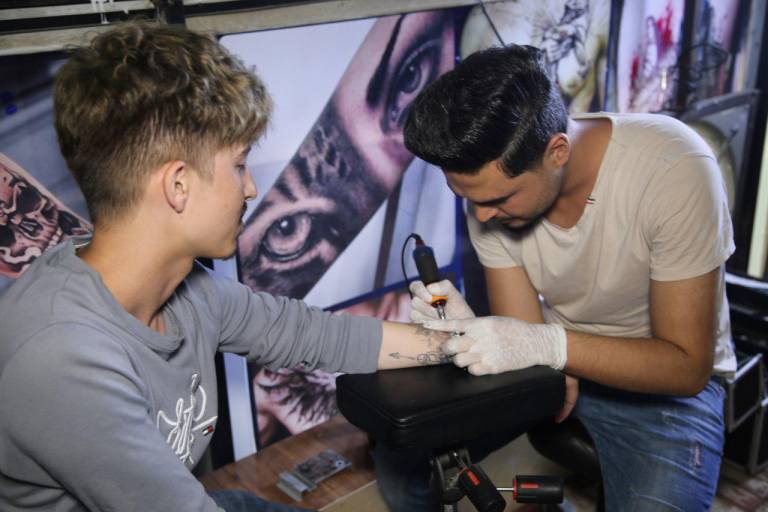Soraya Shahidy, who was born in Kabul, the Afghan capital, left Kabul for Iran before the Taliban took power in 1996. In 2005, Shahidy returned to Kabul, where she reiterated her high school studies. Having graduated from high school, Soraya entered modeling career.
She developed a strong passion for art, and in 2018 she traveled to Turkey to learn tattooing skill.
“I always wanted to get tattoo, so I did,” said Shahidy, the first female tattoo artist in the city, where she is tattooing both female and male clients. “I am very passionate about tattooing and it’s a lovely career.”

With the United States and the Taliban make progress over a peace deal to end 18-year long insurgency, Shahidy is worried about the outcome of the peace talks. She has never seen the Taliban, but fears their return.
In the last 18 years, a new generation has grown up tight with freedom and pop culture. Despite strong preserve of the traditional culture of Afghan society, permanent and temporary tattoos have become popular among the country’s younger generation.
The 18-year long exposure to western culture has transformed Afghanistan’s previously isolated society, and a love of tattoos has taken hold. Young men and women in Kabul, and some other Afghan cities wear skinny jeans and embroidered jackets, and take pride in elaborate hairstyles sculpted with thick gel.
Although such a practice is one unexpected legacy of the US-led NATO presence in the country, many Afghans demand to keep it continue.
Several Afghans, however, consider tattoos to be forbidden under Islamic law and mullahs are critical, describing it as a mutilation of human body.
“I really like it, and it is meaningful to so many of my clients,” said Qahar Abolfazl, 24-year old tattoo artist in Pul-e-Sorkh neighborhood of Kabul. “Boys and girls come to get tattooed. Sometimes it has a special meaning or lovers come to get the same tattoo to keep their memories alive on their skin.”
Two streets away from Abolfazl’s saloon in Pul-e-Sorkh neighborhood, Mullahs preach against this practice among teenagers. They, however, tolerate it and do not demand direct action against tattoo artists.
But they keep talking against all forms of western culture, in particular tattoo.
“The society is influenced by materials,” said Mohammad Jawad, a local mullah in the neighborhood. “We are Muslims by names, not by practice, we do not practice sharia law.”
Jawad argues many Afghans do not follow the right morals and practicing of Islamic law, and instead they follow western culture.
“When things go wrong, we should go back to the Islamic law,” said Jawad, who teaches Islamic studies at a government-funded vocational institution. “Prophet Mohammad says that you should show the right and the wrong ways to people.”
Street by street, religious scholars and hair dressers have lived for nearly two decades in a peaceful coexistence in the capital. Afghan big cities have grown more tolerant and can tolerate people with different beliefs, a phenomenon that was invisible during the Taliban rule.
But recent US-Taliban talks have made many Afghans—especially youngsters in big cities—worried about living in a society with the Taliban in power. They have seen nothing else, but wars and suicide bombings in their own hometown. And they are thirsty for peace.
“I have gotten a tattoo of owl, which is sign of good fortune and it makes me feel unique,” said Mohsen Khawar, 24-year old, tattoo lover. “I just want to live in peace and continue living in my own lifestyle.”
The Taliban group have repeatedly claimed that they share power with other politicians of the country. Officials of the group say fighters of the Taliban respect women rights, and allow them to attend school and work outside their homes.

Will the Taliban allow tattoo artists like Shahidy to open saloon in the Afghan capital?
For tattoo artist Shahidy, who is a single mom, new political system has given a second chance of life. When Shahidy was 19-year old, she was stuck in an abusive relationship. Under new law and orders of the country, Shahidy easily got her divorce and kept her son.
“I feel like I am the luckiest woman in Afghanistan,” said Shahidy. “When the Taliban return back, I will be the first one who protests.”




